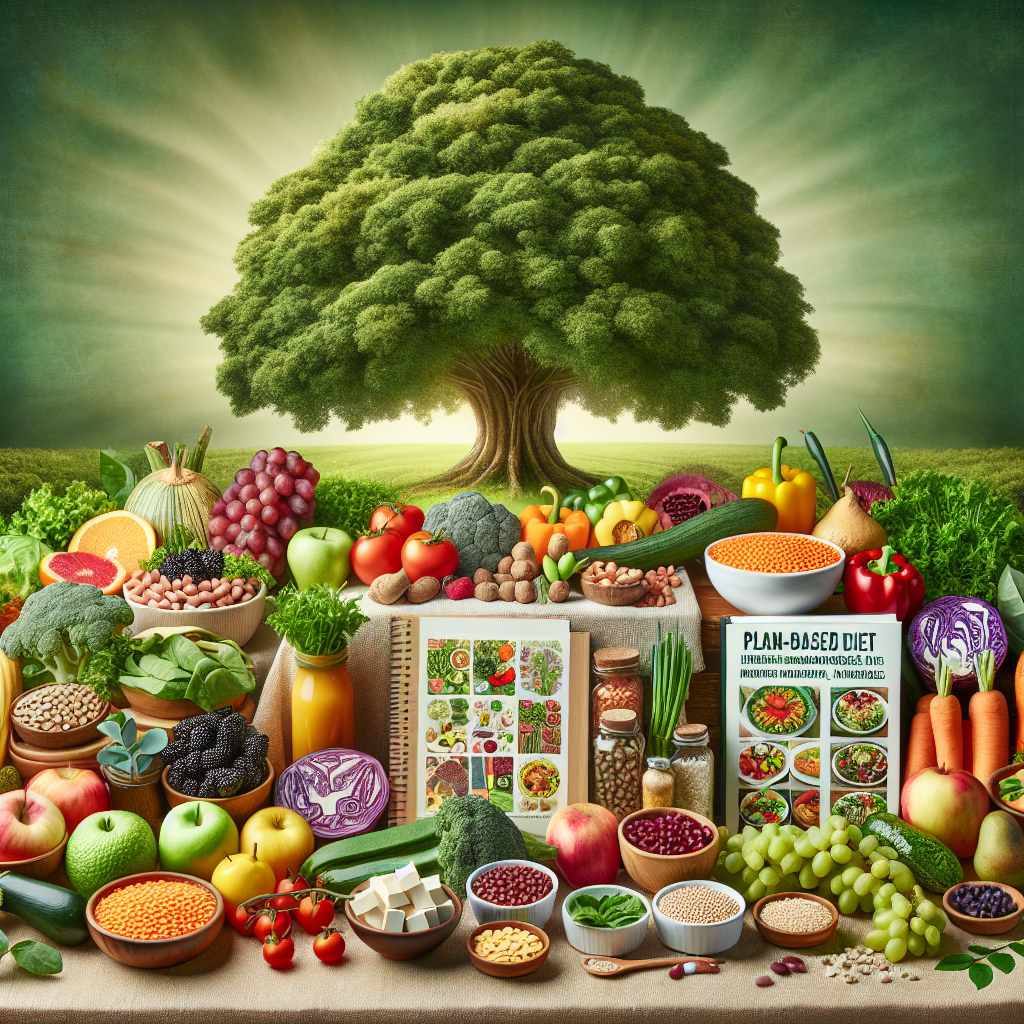Are you curious about plant-based diets and wondering if it’s the right choice for you? Look no further! In this article, we will provide you with everything you need to know about plant-based diets. From its health benefits to tips on getting started, we’ve got you covered. So grab a cup of tea, sit back, and let’s dive into the world of plant-based eating together.

Plant-Based Diet Overview
Definition of a Plant-Based Diet
A plant-based diet is a dietary approach that focuses on consuming foods primarily derived from plants, such as fruits, vegetables, whole grains, legumes, nuts, and seeds. It emphasizes the consumption of plant sources for nutrition and limits or eliminates the intake of animal products.
Difference Between Plant-Based and Vegan Diets
While both plant-based and vegan diets have a foundation in consuming plant foods, there is a distinct difference between the two. A vegan diet is a lifestyle that goes beyond food choices and extends to all areas of life, avoiding the use of animal products altogether, including in clothing and personal care. On the other hand, a plant-based diet is centered on food choices and prioritizes plant sources for nutrition, without strict limitations on non-food products.
Health Benefits of a Plant-Based Diet
Reduced Risk of Chronic Diseases
Adopting a plant-based diet has been shown to reduce the risk of chronic diseases, such as heart disease, type 2 diabetes, and certain types of cancer. Plant-based foods are typically low in saturated fat and high in dietary fiber, vitamins, minerals, and antioxidants, all of which contribute to improved overall health.
Weight Loss and Management
A plant-based diet can be an effective tool for weight loss and weight management. The emphasis on whole, unprocessed plant foods naturally leads to a lower calorie intake and higher nutrient density, which can result in sustainable weight loss. Additionally, plant-based diets are typically high in dietary fiber, which promotes feelings of fullness and helps control appetite.
Improved Digestive Health
Plant-based diets, especially those rich in whole grains, fruits, and vegetables, are beneficial for digestive health. The high fiber content found in plant foods helps maintain regular bowel movements, prevents constipation, and supports a healthy gut microbiome. It also reduces the risk of developing gastrointestinal disorders, such as diverticulosis and colorectal cancer.
Increased Energy Levels
Plant-based diets provide the body with a constant source of energy due to their high content of complex carbohydrates. These carbohydrates are broken down into glucose, which is the body’s preferred source of fuel. Additionally, plant-based diets often include foods rich in B vitamins, which play a crucial role in energy production and metabolism.
Types of Plant-Based Diets
Whole Food Plant-Based Diet
A whole food plant-based diet is centered around consuming unprocessed or minimally processed foods in their most natural form. It emphasizes whole grains, fruits, vegetables, legumes, nuts, and seeds, while avoiding or minimizing the intake of refined grains, added sugars, and processed foods.
Raw Food Diet
The raw food diet is based on consuming uncooked or minimally processed foods that have not been heated above 118°F (48°C). The primary focus is on fruits, vegetables, seeds, nuts, and sprouted grains. Advocates of this diet believe that cooking food destroys certain enzymes and nutrients, and that consuming raw foods can maximize health benefits.
Flexitarian Diet
The flexitarian diet is a flexible approach to plant-based eating that allows for occasional consumption of animal products. It is primarily plant-based, with an emphasis on fruits, vegetables, whole grains, legumes, and plant-based proteins, but also allows for occasional inclusion of poultry, fish, eggs, and dairy products in moderation.
Mediterranean Diet
Although not exclusively plant-based, the Mediterranean diet places a strong emphasis on consuming plant foods such as fruits, vegetables, whole grains, legumes, nuts, and olive oil. It also includes moderate consumption of fish, poultry, eggs, and dairy, while limiting red meat and processed foods. This diet is inspired by the traditional dietary patterns of Mediterranean countries and has been associated with numerous health benefits.
Key Nutrients in a Plant-Based Diet
A well-planned plant-based diet can provide all the necessary nutrients for optimal health. It’s important to pay attention to the following key nutrients:
Protein
Protein is essential for building and repairing tissues, producing enzymes and hormones, and maintaining a strong immune system. Plant-based sources of protein include legumes, such as beans, lentils, and chickpeas, as well as tofu, tempeh, nuts, and seeds. It’s important to incorporate a variety of these protein-rich foods to ensure adequate intake of all essential amino acids.
Carbohydrates
Carbohydrates are the body’s primary source of energy and are essential for brain function and physical activity. Whole grains, fruits, vegetables, legumes, and starchy vegetables like potatoes are all excellent sources of carbohydrates in a plant-based diet. It’s important to opt for complex carbohydrates that provide sustained energy and fiber, rather than refined carbohydrates.
Fats
Healthy fats play a crucial role in hormone production, nutrient absorption, and maintaining cell structure. Plant-based sources of healthy fats include avocados, nuts, seeds, and plant-based oils like olive oil. It’s important to choose unsaturated fats and limit intake of saturated and trans fats, which are commonly found in animal-based products.
Vitamins and Minerals
Plant-based diets can provide all the necessary vitamins and minerals when properly planned. However, attention should be given to certain nutrients that may require extra attention:

Sources of Plant-Based Protein
Plant-based diets can easily meet protein needs through a variety of sources. Here are some examples:
Legumes and Pulses
Legumes and pulses, including beans, lentils, chickpeas, and soybeans, are excellent sources of plant-based protein. They are also rich in fiber, iron, and other essential nutrients.
Nuts and Seeds
Nuts and seeds, such as almonds, walnuts, chia seeds, and hemp seeds, are not only great sources of protein but also provide healthy fats, fiber, and various vitamins and minerals.
Tofu and Tempeh
Tofu and tempeh, made from soybeans, are popular plant-based protein options. They are versatile ingredients that can be used in a variety of dishes and provide a good amount of protein per serving.
Quinoa and Amaranth
Quinoa and amaranth are pseudograins that are high in protein and contain all essential amino acids. They can be used as alternatives to rice or pasta and are often considered staple foods in a plant-based diet.
Balancing Macronutrients in a Plant-Based Diet
In a plant-based diet, it is essential to balance macronutrients – carbohydrates, proteins, and fats – to ensure optimal nutrition and energy levels.
Importance of Carbohydrates, Proteins, and Fats
Carbohydrates provide quick energy, proteins support muscle growth and repair, and fats provide long-lasting energy and support nutrient absorption. Each macronutrient plays a unique role in the body and should be included in adequate amounts in a plant-based diet.
Calculating Daily Macronutrient Ratios
Calculating the ideal macronutrient ratios can vary depending on individual needs and goals. It’s important to consult with a healthcare professional or registered dietitian to determine the best macronutrient ratios for your specific situation. They can take factors such as age, gender, activity level, and overall health into account and provide personalized recommendations.
Essential Vitamins and Minerals for Plant-Based Dieters
While a well-planned plant-based diet can provide most essential vitamins and minerals, certain nutrients may require extra attention.
Vitamin B12
Vitamin B12 is primarily found in animal-based foods and is crucial for nerve function, DNA synthesis, and the production of red blood cells. Plant-based individuals should consider fortified foods or supplements as reliable sources of vitamin B12.
Iron
Iron is essential for oxygen transport and energy production. Plant-based sources of iron include dark leafy greens, legumes, fortified cereals, and dried fruits. Iron absorption can be enhanced by consuming vitamin C-rich foods, such as citrus fruits, alongside iron-rich foods.
Calcium
Calcium is necessary for strong bones and teeth, muscle function, and nerve transmission. Plant-based sources of calcium include leafy green vegetables, tofu, fortified plant-based milk, and calcium-set tofu.
Omega-3 Fatty Acids
Omega-3 fatty acids are important for brain health, heart health, and inflammation regulation. Plant-based sources of omega-3s include flaxseeds, chia seeds, hemp seeds, walnuts, and algae-based supplements.
Tips for Transitioning to a Plant-Based Diet
Transitioning to a plant-based diet can be done gradually or cold turkey, depending on individual preferences and goals.
Gradual Transition vs. Cold Turkey
Some individuals prefer to gradually incorporate more plant-based meals into their diet, allowing their taste buds and digestive system to adjust over time. Others may thrive by making an immediate switch to a completely plant-based diet. Choose the approach that feels most sustainable and enjoyable for you.
Meal Planning and Prepping
Meal planning and prepping can be particularly helpful when adopting a plant-based diet. Plan your meals for the week, create a shopping list, and prep ingredients or full meals in advance. This will save time, ensure balanced meals, and reduce the likelihood of relying on unhealthy convenience foods.
Exploring New Recipes and Ingredients
Embrace the opportunity to explore new recipes and ingredients in your plant-based journey. Experiment with different grains, legumes, fruits, vegetables, herbs, and spices to create a diverse and exciting menu. Join online communities or seek out cookbooks for plant-based recipe inspiration.
Challenges of a Plant-Based Diet
Meeting Nutritional Needs
While a well-planned plant-based diet can meet all nutritional needs, there may be challenges in ensuring optimal intake of certain nutrients, such as vitamin B12, iron, calcium, and omega-3 fatty acids. This is why it’s crucial to be mindful of nutrient-rich plant-based sources and consider supplementation if necessary.
Social and Dining Out Challenges
Social situations and dining out can present challenges for plant-based individuals. It’s helpful to communicate your dietary preferences and needs in advance, suggest plant-based restaurants or menu options when dining out, and consider bringing a plant-based dish to gatherings or events to ensure there are suitable options available.
Navigating Labeling and Ingredient Lists
Navigating labeling and ingredient lists can be overwhelming, as certain products may contain animal-derived ingredients or be processed on shared equipment. It’s important to familiarize yourself with common non-vegan ingredients and look for clear labeling or certifications indicating that a product is plant-based or vegan.
Conclusion
Benefits of Embracing a Plant-Based Diet
Embracing a plant-based diet offers numerous benefits for your health, such as reduced risk of chronic diseases, weight management, improved digestive health, and increased energy levels. It also has positive environmental implications, as plant-based diets tend to have lower carbon footprints and promote sustainable choices for the planet.
Importance of Personalized Nutrition
While the overall principles of a plant-based diet are well-established, it’s essential to personalize your nutrition to meet your individual needs and goals. Consulting with a healthcare professional or registered dietitian can provide tailored guidance to ensure you are meeting all your nutritional requirements.
Sustainable Choices for the Planet
By adopting a plant-based diet, you are making a conscious choice towards more sustainable and eco-friendly practices. Plant-based diets have lower greenhouse gas emissions, require less land and water resources, and reduce the exploitation of animals. Your dietary choices can have a positive impact on the planet and contribute to a more sustainable future.
